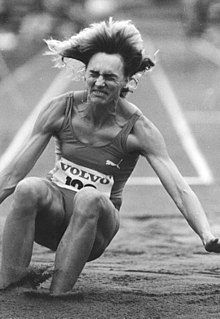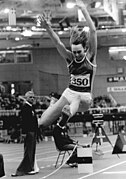Heike Drechsler
You can help expand this article with text translated from the corresponding article in German. (December 2021) Click [show] for important translation instructions.
|
 Drechsler at long jump | ||||||||||||||||||||||||||||||||||||||||||||||||||||||||||||||||||||||||||||||||||||||||||
| Personal information | ||||||||||||||||||||||||||||||||||||||||||||||||||||||||||||||||||||||||||||||||||||||||||
|---|---|---|---|---|---|---|---|---|---|---|---|---|---|---|---|---|---|---|---|---|---|---|---|---|---|---|---|---|---|---|---|---|---|---|---|---|---|---|---|---|---|---|---|---|---|---|---|---|---|---|---|---|---|---|---|---|---|---|---|---|---|---|---|---|---|---|---|---|---|---|---|---|---|---|---|---|---|---|---|---|---|---|---|---|---|---|---|---|---|---|
| Birth name | Heike Gabriela Daute[1] | |||||||||||||||||||||||||||||||||||||||||||||||||||||||||||||||||||||||||||||||||||||||||
| Nickname | Heike Spix[1] | |||||||||||||||||||||||||||||||||||||||||||||||||||||||||||||||||||||||||||||||||||||||||
| Nationality | German | |||||||||||||||||||||||||||||||||||||||||||||||||||||||||||||||||||||||||||||||||||||||||
| Born | 16 December 1964[1] Gera, Bezirk Gera, East Germany[1] | |||||||||||||||||||||||||||||||||||||||||||||||||||||||||||||||||||||||||||||||||||||||||
| Height | 181 cm (5 ft 11 in)[1] | |||||||||||||||||||||||||||||||||||||||||||||||||||||||||||||||||||||||||||||||||||||||||
| Weight | 68 kg (150 lb)[1] | |||||||||||||||||||||||||||||||||||||||||||||||||||||||||||||||||||||||||||||||||||||||||
| Sport | ||||||||||||||||||||||||||||||||||||||||||||||||||||||||||||||||||||||||||||||||||||||||||
| Sport | Track and field | |||||||||||||||||||||||||||||||||||||||||||||||||||||||||||||||||||||||||||||||||||||||||
Medal record
| ||||||||||||||||||||||||||||||||||||||||||||||||||||||||||||||||||||||||||||||||||||||||||
| Updated on 30 June 2015 | ||||||||||||||||||||||||||||||||||||||||||||||||||||||||||||||||||||||||||||||||||||||||||
Heike Gabriela Drechsler (German pronunciation: [ˈhaɪkə ˈdʁɛkslɐ] ⓘ; née Daute; born 16 December 1964) is a German former track and field athlete who represented East Germany and later Germany. One of the most successful long jumpers of all-time, she is a former world record holder and ranks third on the all-time list with her legal best of 7.48 metres in 1988. Her marginally wind-assisted jump of 7.63 metres (+2.1) in 1992 at altitude in Sestriere, is still the furthest a woman has ever long jumped. She is the only woman who has won two Olympic gold medals in the long jump, winning in 1992 and 2000.
Drechsler also won Olympic medals in the 100 metres and 200 metres in 1988, a silver medal in the 100 metres at the 1987 World Championships, and is a former world record holder in the 200 metres with 21.71 seconds in 1986.
Biography
[edit]Drechsler was born in Gera, Bezirk Gera, East Germany (now Thuringia, Germany). As a teenager she was active in the Free German Youth (FDJ) and in 1984 she was elected to the Volkskammer of East Germany.
Initially a very competitive long jumper early in her career as a teenager, Drechsler made a transition into the world of elite sprinting in 1986 at the age of 21. She married Andreas Drechsler in July 1984 and competed as Heike Drechsler from then on. She was coached by Erich Drechsler, her father-in-law.[2]
In addition to her Olympic success, Drechsler won two World Championships in the long jump (1983 and 1993), as well as gold medals in the long jump and the 200 m sprint in the World Indoor Championships 1987. She also had numerous successes in European and German championships. Drechsler's greatest rival in the long jump was Jackie Joyner-Kersee, with whom she was also very good friends.
In 1986, Drechsler twice equalled Marita Koch's 200 metres sprint (21.71 seconds) world record and set two long jump world records and equalled one in 1985 and 1986.
According to an article written by Ron Casey (an Australian statistician), in 1986 Drechsler made significant improvements to her 100 m and 200 m times. In one season she went from an 11.75-second 100 m to 10.91 seconds. Her 200 m time improved from 23.19 seconds to 21.71 seconds (equaling the world record) in the 1986 season.
Her 21.71 second performance for 200 m was run into a head wind of −0.8 m/s. By comparison, Marita Koch's 21.71 second runs in 1979 and 1984 had tail winds of +0.7 m/s and +0.3 m/s respectively.
Drechsler's 200 m performance of 21.71 seconds into a head wind (−0.8 m/s) is one of the fastest ever run by a woman in the history of track and field.
In October 1986, she was awarded a Star of People's Friendship in gold (second class) for her sporting success.[3] Several German websites, including her own, claim that Heike Drechsler was voted "Athlete of the Century" in 1999 by the IAAF. This is not quite correct: she was put on the "shortlist",[4] but the award was given to Fanny Blankers-Koen.[5]
Personal records
[edit]Long jump
[edit]1983: 7.14 m (23 ft 5 in) in Bratislava / (Juniors)
1985: 7.44 m (24 ft 5 in) in East Berlin
1986: 7.45 m (24 ft 5+1⁄4 in) in Tallinn
1988: 7.48 m (24 ft 6+1⁄2 in) in Neubrandenburg[6]
1992: 7.63 m (25 ft 1⁄2 in) in Sestriere[6]
Drechsler's 1992 jump in Sestriere was made with a tailwind of 2.1 meters per second, just 0.1 m/s over the allowable level of 2.0 m/s to be considered a world record; it was also performed at an altitude of greater than 1000 meters above sea level, which is the level beyond which marks are designated to have been achieved "at altitude." The jump is 11 cm longer than the current world record.
200 metres
[edit]1986: 21.71 seconds in Jena[7][8][9]
1986: 21.71 seconds in Stuttgart[7][9]
Heptathlon
[edit]1981: 5891 Points (Junior)
1994: 6741 Points in Talence
Doping allegations
[edit]There were many accusations of drug use while she competed for East Germany. She has never failed a drug test during her career; however, all East German athletes competing abroad were tested before departure to avoid getting caught.[10] In 2001, the BBC claimed she has admitted to unknowingly taking prohibited substances in the early 1980s under orders from her team doctors.[11]
In 1991, after the fall of East Germany, Brigitte Berendonk and Werner Franke found several theses and dissertations quoting former GDR doping researchers in the Military Medical Academy Bad Saarow (MMA). The basis of the work reconstructed state-organized doping practices involving many well-known GDR athletes, including Heike Drechsler. Indications were that Heike Drechsler used high doses of Oral Turinabol plus more testosterone ester injections before competitions from 1982 to 1984.[12] In 1993, Drechsler challenged Brigitte Berendonk, accusing her of lying in a lawsuit.[13] In the case, the full annual dosage schedules, and charts of the development of sport performance as a function of the dosage amount, were released. Drechsler lost the lawsuit.[14][15] However, Drechsler continued to win titles after the DDR time (after 1989), when she started for the merged German team and was tested regularly.
Gallery
[edit]See also
[edit]References
[edit]- ^ a b c d e f Evans, Hilary; Gjerde, Arild; Heijmans, Jeroen; Mallon, Bill; et al. "Heike Drechsler". Olympics at Sports-Reference.com. Sports Reference LLC. Archived from the original on 23 May 2015. Retrieved 30 June 2015.
- ^ Heike Drechsler. Sporting Heroes. Retrieved on 11 April 2014.
- ^ "Hohe staatliche Auszeichnungen verliehen" [Awarded high state awards]. Neues Deutschland (in German). Vol. 42, no. 243. 15 October 1986. p. 6. Archived from the original on 23 September 2018. Retrieved 23 September 2018.
- ^ "Fehler". Archived from the original on 26 November 2016. Retrieved 8 October 2005.
- ^ "IAAF International Association of Athletics Federations - IAAF.org - News - Article". Archived from the original on 1 February 2004.
- ^ a b IAAF All time stats
- ^ a b ""Ewige" Bestenliste der deutschen Leichtathletik". leichtathletik.de. 27 September 2012. Archived from the original on 24 December 2013. Retrieved 24 February 2013.
- ^ "National Lists of Germany (Men)". apulanta.fi. Retrieved 24 February 2013.
- ^ a b "Track and Field all-time". alltime-athletics.com. Retrieved 24 February 2013.
- ^ Janofsky, Michael (29 November 1990). "Drug Use by Prominent Athletes Reported". The New York Times.
- ^ BBC | Drechsler keeps on jumping
- ^ Brigitte Berendonk: Doping documents – From Scientific Research to Cheating. Springer-Verlag, Berlin 1991, ISBN 3-540-53742-2, p. 125, Table 7
- ^ ↑ Cf Uwe Mueller / Grit Hartman: Forward and forget it! Kader, spies and accomplices – The dangerous legacy of the SED dictatorship, Berlin 2009, p. 215
- ^ ↑ Brigitte Berendonk: Doping documents – From Scientific Research to Cheating. Springer-Verlag, Berlin 1991, ISBN 3-540-53742-2, p. 122, Fig 6
- ^ ↑ Brigitte Berendonk: Doping documents – From Scientific Research to Cheating. Springer-Verlag, Berlin 1991, ISBN 3-540-53742-2, p. 133, Figure 11
External links
[edit]- Daute-Drechsler rzutyiskoki.pl Archived 17 September 2018 at the Wayback Machine
- Home page of Heike Drechsler (in German)
- Heike Drechsler at World Athletics
- 2015 Interview
- USA Indoor Track and Field Championships winners
- 1964 births
- Living people
- Sportspeople from Gera
- Sportspeople from Bezirk Gera
- Socialist Unity Party of Germany politicians
- Members of the 9th Volkskammer
- Free German Youth members
- East German female long jumpers
- East German female sprinters
- German female long jumpers
- German female sprinters
- German heptathletes
- Olympic athletes for East Germany
- Olympic athletes for Germany
- Athletes (track and field) at the 1988 Summer Olympics
- Athletes (track and field) at the 1992 Summer Olympics
- Athletes (track and field) at the 1996 Summer Olympics
- Athletes (track and field) at the 2000 Summer Olympics
- World Athletics Championships athletes for East Germany
- World Athletics Championships athletes for Germany
- Female members of the Volkskammer
- German sportsperson-politicians
- Olympic silver medalists for East Germany
- Olympic bronze medalists for East Germany
- Olympic gold medalists for Germany
- Medalists at the 1988 Summer Olympics
- Medalists at the 1992 Summer Olympics
- Medalists at the 2000 Summer Olympics
- Olympic gold medalists in athletics (track and field)
- Olympic silver medalists in athletics (track and field)
- Olympic bronze medalists in athletics (track and field)
- World Athletics Championships medalists
- European Athletics Championships medalists
- Goodwill Games medalists in athletics
- World record setters in athletics (track and field)
- World Athletics indoor record holders
- Recipients of the Patriotic Order of Merit in gold
- Recipients of the Order of Merit of Baden-Württemberg
- Recipients of the Silver Laurel Leaf
- Track & Field News Athlete of the Year winners
- World Athletics Indoor Championships winners
- World Athletics Championships winners
- Competitors at the 1986 Goodwill Games
- Competitors at the 1994 Goodwill Games
- Friendship Games medalists in athletics
- Stasi informants
- East German Athletics Championships winners




